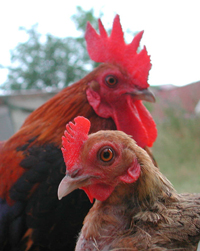 Fakery is seen throughout the animal kingdom and is especially evident in the realm of mate selection and mating behavior. A puzzling behavior frequently observed in many species is copulation between males and females without the delivery of semen. In a world where reproduction is key to a species, survival, such behavior poses a real mystery. In a study that sheds new light on the evolution of sexual behavior, researchers have utilized a novel technique to reveal that in feral chickens, the simple stimulus generated by male mounting--in the absence of actual insemination--reduces the sexual promiscuity of a hen, indicating that even copulations that do not result in semen transfer may be crucial to defend the paternity of a male.
Fakery is seen throughout the animal kingdom and is especially evident in the realm of mate selection and mating behavior. A puzzling behavior frequently observed in many species is copulation between males and females without the delivery of semen. In a world where reproduction is key to a species, survival, such behavior poses a real mystery. In a study that sheds new light on the evolution of sexual behavior, researchers have utilized a novel technique to reveal that in feral chickens, the simple stimulus generated by male mounting--in the absence of actual insemination--reduces the sexual promiscuity of a hen, indicating that even copulations that do not result in semen transfer may be crucial to defend the paternity of a male.
Females of many species often copulate with multiple males, leading to the phenomenon of sperm competition--the competition between the ejaculates of different males to successfully fertilize eggs. The battles of sperm competition occur at the cellular and molecular levels and involve the production of sperm-associated substances that boost the competitiveness of a male's sperm; however, the production of these substances comes at an energetic cost to males. Males who can avoid such costs--and still successfully mate--may be at a reproductive advantage. Therefore, in some species, males may avoid sperm competition by preventing females from mating with other males. However, previous studies have not fully considered the possibility that female promiscuity may be inhibited by stimuli generated by the simple act of male mounting.
In the new study, a team of researchers led by Dr. Tommaso Pizzari of the University of Oxford tested this idea in the feral chicken, a sexually promiscuous species. By using a novel but technologically simple technique--fitting some hens with a light plastic harness covering their cloaca and thus preventing insemination--the researchers were able to separate the effect of insemination products from that of mounting alone and to detect the behavioral response of hens. The use of this technique demonstrated that mounting alone (independently of insemination) not only drastically inhibits the propensity of a hen to mate with a new rooster but also reduces the number of sperm that she obtains from a new rooster in the 2–4 days following mounting.
The researchers therefore showed that roosters can defend their paternity by reducing the promiscuity of the hens that they have inseminated; they do so by exploiting in these hens the response to the simple stimulus of mounting. Consistent with this idea, roosters often mount hens that they previously inseminated, but without subsequently delivering additional semen.
The study demonstrates that even though the ultimate function of sex is fertilization, copulations resulting in the delivery of little or no sperm are not necessarily functionally meaningless but may instead have an important evolutionary significance.
Source : Cell Press
 Print Article
Print Article Mail to a Friend
Mail to a Friend
